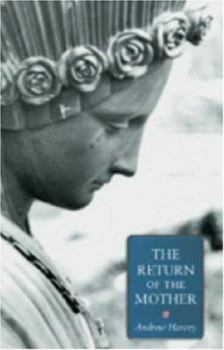The Return of the Mother
Select Format
Select Condition 
Book Overview
Here is Andrew Harvey's most complete statement on Mary and his vision of the Divine Mother as both a social and spiritual revolutionary."Perhaps the most radical aspect of Harvey's message is also... This description may be from another edition of this product.
Format:Hardcover
Language:English
ISBN:1883319072
ISBN13:9781883319076
Release Date:April 1995
Publisher:Frog in Well
Length:493 Pages
Weight:1.90 lbs.
Dimensions:1.6" x 5.8" x 9.3"
Customer Reviews
3 ratings
Interesting Read and a lot like Aesthetic Realism
Published by Thriftbooks.com User , 15 years ago
Great writer and book but in it philosophical notions reads a lot like the teachings of Eli Siegel and Aesthetic Realism. You could change out Eli Siegel's use of the "aesthetic realism" with "divine feminine". Harvey is a smart writer, however, but I am wondering now if the acceptance of the mother is just a renaming of the patriarchy with feminine terms. I'm not saying it is, I am just wondering now. Hierarchy seems like hierarchy. This is an interesting read from someone from All Souls College, though. Something interesting from All Souls College in itself is radical.
A 3rd Point of View
Published by Thriftbooks.com User , 20 years ago
Andrew Harvey took on an ambitious project with this book-an attempt to integrate a variety of religious traditions in their viewpoint of the Divine Mother. Mostly, the book focuses on individual practitioners of various traditions. The tragedy of the loss of the role of the Mother in spiritual traditions is exemplified by the fact that these practitioners are men.Harvey brings in viewpoints from Hinduism, Christianity, Buddhism and Taoism with good effect. His attempts at Australian Aboriginal beliefs are less effective, with his sources being too far removed from Aboriginals themselves. His writing on other religious traditions has the immediacy of direct experience and years of study which his writing on Aborigines lacks. Perhaps Harvey could use a field trip to Australia. He also makes numerous references to other indigenous tribal cultures, but fails to explain what it is exactly that he finds so admirable about their way of embracing the Mother.Harvey's primary argument, that we should all approach the Divine directly rather than through gurus is obviously a backlash against his own experience with a guru-a relationship he has clearly become disenchanted with. His disillusionment with gurus threatens to overshadow the book, but ultimately does not. His point is well taken, though most people need teachers and books to guide them to a direct relationship with the Divine. The irony, of course, is that we don't need books like Harvey's if we approach the Divine directly. If we don't need teachers to show us the way, we don't need books to do so either! Harvey urges us not to deify our teachers, and to learn from his experience.I feel I must offer a counterpoint to the surprisingly negative review by "Rosa from San Antonio" (below) because I find her criticism to be unjustified and can't imagine how she came to her bitter conclusions. I wonder if she has a personal vendetta against openly gay men (which Harvey is) or takes offense at the casual way Harvey mentions his relationship with Eryk Hanut throughout the book. I find it hard to imagine how Rosa could conclude that this book exists to justify his relationship, though of course we are all entitled to our opinions.My main criticism of this book is Harvey's tendency to repeat and emphasize passages in a way I find unnecessary and redundant. I think he tends to make the same point too many times. The prose is sometimes crushingly dense. The book, I found, is slow reading, and sometimes wearily academic on a subject where academia is of little use. However, considering the massive undertaking that this book truly is, and how much needed its perspective is, I can easily give this book 4 stars.~heidimo
passionate, profound
Published by Thriftbooks.com User , 21 years ago
In contrast to the first review in this section, I think that Harvey's 'The Return of the Mother' is a truly extraordinary book. It is certainly not just a 'series of excuses' for the author's lifestyle - the whole point of Harvey's vision of the maternal aspect of God is that She passionately combines and unifies the personal, immanent and sexual with the vast stillness and calm of Her transcendent being. She can be felt and apprehended in the most intimate areas of life, working and transforming. If you want a synopsis of the Eternal Feminine in world religions, get Anne Baring's 'The Myth of the Goddess' or (for a Jungian approach) get Erich Neumann's 'The Great Mother.' Harvey's book is a passionate - though deeply deeply learned - description of the need for spiritual awkening through the Feminine, dissolving outworn dualities. I cannot pretend that this book is easy going; every page is crammed with challenging insights, all is Harvey's beautifully lucid prose. Only one whose spiritual journey has taken him from 'tortured aesthete' to religious visionary could come up with the astonishing, extravagant description of the destructive aspect of the Mother as 'Callas-Kali, who runs at the heart of illusion with a knife.'Furthermore I don't pretend to fully understand this book, but its message is urgent, inspiring and beautiful. And yes, personal.





